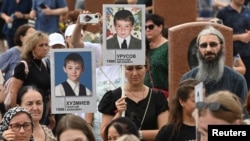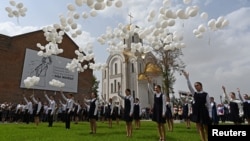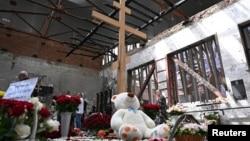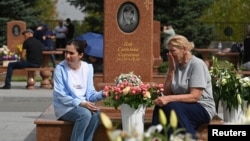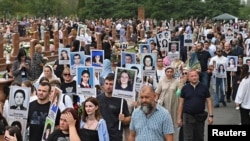Two decades after the Beslan school siege — a notorious terrorist attack on a Russian school that left more than 300 people dead — families of the victims are still demanding answers about what happened and why an official investigation has never been completed.
On Sept. 1, 2004, the first day of the school year in Russia, more than 30 heavily armed gunmen seized a school in Beslan, a town in North Ossetia – a majority Christian autonomous republic located, like Muslim-majority Chechnya, in Russia’s North Caucasus region. The gunmen belonged to Riyad-us Saliheen, an Islamist group headed by Chechen separatist warlord Shamil Basayev.
After taking more than 1,000 people hostage, including teachers, parents and over 700 children, they demanded that Moscow withdraw its troops from Chechnya, then in the middle of its second separatist war against the federal authorities, and recognize Chechen independence.
On the third day of the hostage-taking, Russian security forces stormed the school. In the ensuing fighting, 334 people died, 186 of them children.
The next day, Vladimir Putin, then in his fourth year as Russia’s president, made a pre-dawn visit to Beslan, visiting wounded victims from the incident in a hospital. Still, he was later criticized for not meeting with victims’ families.
In a speech to the nation on the evening of Sept. 4, 2004, Putin said, “We did not fully understand the complexity and the dangers of the processes at work in our own country and in the world,” adding: “We showed ourselves to be weak. And the weak get beaten.”
Late last month, with the 20th anniversary of the Beslan tragedy approaching, Putin made his first visit back to Beslan, where he met with three mothers of children who died in the school – Susanna Dudieva, chairperson of the “Mothers of Beslan” committee, and her co-chairs, Rita Sidakova and Aneta Gadieva.
The three accused Putin of dragging his feet on an official investigation into the events in Beslan, which was launched in Russia’s parliament in 2006 amid critics’ allegations that the federal authorities had sabotaged attempts to negotiate for the hostages’ release and then used excessive force.
After the meeting, Gadieva told the online Russian media outlet Agentstvo that Putin had said he didn’t know much about the investigation.
According to the Kremlin’s transcript of the conversation between Putin and the three women, the Russian president blamed unidentified foreign forces for the Beslan hostage seizure and cited the attack as justification for the invasion of Ukraine – this despite strong statements of support for Russia at the time from the United States, Ukraine and other countries, along with planeloads of relief supplies.
Alexander Cherkasov is a leading expert on the North Caucasus who was chair of the Memorial human rights center, which was shut down by the Russian authorities in 2021 and awarded the Nobel Peace Prize the following year.
He told VOA’s Russian service that the Beslan tragedy was motivated not by foreign forces but – at least in part — by the indiscriminate actions of Russian forces in Chechnya. These included “counter-terrorist” raids in which civilians were kidnapped, tortured and killed, further radicalized the separatists who were fighting Moscow.
“The brute force tactics used by the federal center in the Caucasus generated discontent,” Cherkasov said. “It created a mobilization base for the armed underground. The weapons seized in Ingushetia [from a government arms depot during a June 2004 raid by militants led by Shamil Basayev] were later used in Beslan. And it was not just the militant commanders who were involved, but also rank-and-file participants in terrorist attacks. Many of them did not just join the terrorists for no reason.”
In 2005, Marina Litvinovich, a Russian opposition activist and politician, created an online platform, “Truth of Beslan,” to independently collect data on the Beslan terrorist attack.
She told VOA that in the 20 years since the attack, “there has been no fair investigation, and the government has still not acknowledged the difficult truth about how the attack actually happened, how it ended, and why the children died.”
According to Litvinovich, during the events of Sept. 1-3, 2004 in Beslan, Russia’s special services were not primarily focused on saving the hostages
"We received confirmation of this from [then North Ossetia head] Alexander Dzasokhov, who was interrogated in court, that no serious negotiations were conducted. During all three days, no one from the official headquarters conducted negotiations that would have resulted in at least an attempt to free some of the hostages,” she said.
Litvinovich noted that Dzasokhov, working in conjunction with, among others, Ruslan Aushev, a former president of Ingushetia, the North Caucasus autonomous republic located between North Ossetia and Chechnya, and Aslan Maskhadov, the then president of the unrecognized breakaway Chechen Republic of Ichkeria, joined forces in an attempt to negotiate a peaceful end to the Beslan hostage crisis, but were apparently sabotaged by the federal authorities.
“[O]n the morning of September 3, Dzasokhov came out to the relatives of the hostages and said, inspired and uplifted, that ‘new figures had appeared in the negotiation process’ (apparently he meant Maskhadov), and ‘there will be no assault’ [by Russian security forces],” she recalled. “And exactly an hour after this speech, what was later portrayed as the terrorists blowing up the gymnasium occurred."
According to Litvinovich, the federal authorities’ claim that the hostage-takers sparked the bloody end of the Beslan hostage crisis by blowing up the school’s gymnasium, where the hostages were being held, was “a complete lie."
In reality, she said, the full-scale exchange of fire between the hostage-takers and the Russian security forces on the third day of the crisis was sparked when members of the Special Purpose Center of the Russian Federal Security Service (FSB) fired into the school’s gymnasium, using a rocket-propelled infantry flamethrower.
In April 2017, the European Court of Human Rights ruled in a case brought by victims of the Beslan attack and their families that the Russian authorities’ response to the Beslan hostage-taking “suffered from a lack of formal leadership, resulting in serious flaws in decision-making and coordination.”
It also found that “indiscriminate weapons,” including flame-throwers, grenade launchers and a tank cannon, were “used on the buildings where hostages were still being held … which contributed to the heavy causalities among the hostages.”
The court ordered Russia to pay the plaintiffs nearly 3 million euros ($3.2 million).
Russia's Justice Ministry dismissed the court's conclusions as unfounded and unconvincing, in particular calling the court's conclusion that Russian law enforcement agencies indiscriminately used firearms and heavy weapons during the hostage siege "absolutely groundless."
In June 2022, several months after Russia launched its full-scale invasion of Ukraine, Russia's parliament passed legislation ending the European Court of Human Rights’ jurisdiction in Russia.
This article originated in VOA’s Russian Service




